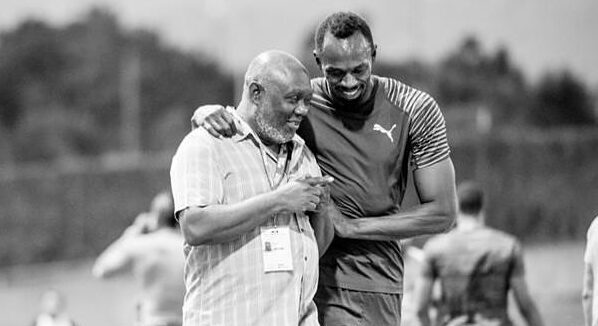

He is a former world record holder. He is the fourth fastest man in history. He has also represented Jamaica in the Olympics, winning gold in Rio, and has multiple World Championship relay medals. Yet, Asafa Powell has often been vocal about how Jamaica’s athletic institutions are run. Over the years, he has called out poor infrastructure, inadequate support systems, and mismanagement, such as the Jamaica Amateur Athletics Association’s (JAAA) mishandling of mandatory training camps in 2009. In 2022, he also made remarks about athletes having to finance their own careers without meaningful support from the country. He pointed out the athletes were not working for Jamaica but for themselves because “Jamaica don’t pay people,” and they had to return home to deal with personal financial obligations. So, when Powell recently said that his children may not represent Jamaica on the track, it was not completely out of the blue.
Watch What’s Trending Now!
Powell was vlogging his children’s sports day on his YouTube channel ‘The Powells’, when he told the viewers that the landscape of track and field in Jamaica needs to change. “So whenever I post videos or anything of the boys doing sports or track, people are always like, ‘Yo, the future looks good’ or ‘Future stars.’ “But honestly, guys, if the support system doesn’t change, my kids are not running for Jamaica. Not running for Jamaica. Sorry to say that — but it’s just facts.”
He also made it clear that his kids, Avani and Liam, have Canadian and Ghanaian roots through his wife, Alyshia, which means they have options beyond Jamaica if they choose to pursue athletics. While he received criticism from some quarters over these comments, Glen Mills, who coached Usain Bolt, shares Powell’s concerns.
ADVERTISEMENT
During his interview with Television Jamaica on April 25, Mills expressed support for Powell’s anger about the Jamaican track and field’s current state. “There needs to be a structure through which athletes who qualify are able to apply for some kind of grant support. You must have a system of criteria because there are a lot of people training — the majority of whom are not going to make it at the international level,” he said.
Mills pointed out that all the stakeholders need to come together, including the Jamaican government. “The question, however, is how should that be done, and who is responsible? Because it’s not going to happen automatically. I think the governing bodies — between the J3A, the JAAA, and to an extent, the government through the SDF — would need to come together to create an avenue for this to happen,” he said.
Mills didn’t just stop at pointing out the problems; he also offered a solution. He suggested creating a financial support system for athletes—a development grant, not a salary, but enough to give athletes the financial stability to focus on their training. “If we create a structure and an athlete can see what is available within this structure, it will give them the option to say, ‘Well, I think I’m good enough to, after a certain time, use this to get to this level,’” Mills explained. His idea was to give athletes a clear path, with financial backing to help them reach their potential.
ADVERTISEMENT
“I don’t really like the word ‘salary,’ but it’s probably the same idea. I see it more as a grant towards an athlete’s development. You could have athletes apply and be placed into different levels, giving them maybe a four-year span to achieve certain targets,” he mentioned, hinting at a solution to their woes.
Jamaica has had decorated sprinters line up for them over the years, but Jamaica has struggled to develop long-term systems to support athletes during the course of their careers. When Asafa Powell was representing Jamaica, the country was grappling with mounting debt, with the debt-to-GDP ratio soaring from 52 percent in 2004 to a staggering 143.9 percent by 2012. In such an economic climate, the athletes received not more than symbolic gestures, national honors, and sporadic cash grants.
ADVERTISEMENT
But today, the Sports Development Foundation (SDF) is responsible for supporting more than 40 sports federations — yet it operates on an annual budget that scarcely exceeds J$600 million. One of the biggest points Mills made was about Jamaica’s missed opportunity to market its track and field talent.
“We are the only country, outside of America, who has ever had the fastest man and the fastest woman in the world,” he said, referring to Usain Bolt and Elaine Thompson-Herah. Yet, despite this incredible achievement, Jamaica has not done enough to capitalize on its top athletes. Mills believes that if the country could better leverage its world-class sprinters, it could attract sponsorships and funding to support a more sustainable system. “The private sector would contribute,” Mills added, emphasizing that marketing Jamaica’s track talent could help raise the money needed to create the kind of system Powell and others are calling for.
Powell isn’t alone in calling for better infrastructure and the lack of support for Jamaican athletes.
ADVERTISEMENT

ADVERTISEMENT
Elaine Thompson-Herah has revealed that she has faced financial problems in the track and field system of Jamaica. In a 2022 interview on Asafa Powell’s YouTube channel, she complained that “A lot of countries only have two to five athletes, and they take care of them whether they are performing or not. We have the best, but we do not get anything from it apart from the endorsements we get from the shoe companies or the local corporate sponsors.” She asked herself how she would handle her everyday costs since her sponsorships were ending, and she wondered, “What would I have? How would I survive? How would I pay bills?”
Yohan Blake also raised the question of not receiving enough respect and recognition in his own country. Speaking after the 2024 Diamond League, he said, “My own country, Jamaica, doesn’t give me the respect. But I’m happy they don’t because other people outside do, and they appreciate me more than my own country.”
The concerns from these athletes reveal a critical issue affecting Jamaica’s track system. While Mills supported Powell’s calls for improvement, he appeared dissatisfied with the statement Powell made about his children possibly not lining up for Jamaica.
ADVERTISEMENT
Money problems are plaguing Jamaica’s track and field stars
During the same interview, the host mentioned Powell’s statement about blocking his children from the Jamaica track and field competition, to which Glen Mills responded with a direct answer. “That’s a bit harsh. I would think that maybe he could have made more of an impact while he was running, to put forward the view that athletes need support, etc., and so on. I don’t think coming at the end of his career like that is going to be interpreted the same way.” Mills seemed unpleased with Powell’s approach to sharing his thoughts because the timing and delivery might not have achieved the desired effect.
Mills recognized that the problems within the track and field system exist, while Powell’s anger towards the system remains valid. Track and field legends, including Elaine Thompson-Herah, have expressed their disappointment about the insufficient support provided to athletes.
ADVERTISEMENT
When Thompson-Herah parted ways with her coach, Shanikie Osbourne, in late 2023. Her management team cited a “breakdown in negotiations” over Osbourne’s compensation package, describing it as “extremely excessive and without any flexibility to negotiate.” Osbourne, however, refuted these claims, stating she was open to negotiation and had only requested a standard 15% coaching fee.
Top Stories
Furious Golf Fans Sign Petition Demanding Suspended PGA Tour Pro’s Reinstatement

Bills Make Final Decision on Firing Sean McDermott’s Staff as Joe Brady Demands Major Changes From Josh Allen & Co.

NFL Makes Punishment Decision on Sam Darnold’s Seahawks After NFC Conference Championship Win

NASCAR’s Clash Now at the Mercy of State Officials Amid Dire Travel Advisory

Jon Rahm Has the Last Laugh as DP World Tour Decides on LIV Golf Fines – Insider

Jordan Spieth Feels Envious of PGA Tour Pro 6 Years His Junior, All Because of a Simple Golf Trait

These instances underscore the financial challenges faced by Jamaican athletes, even those at the pinnacle of their sport in track and field.
ADVERTISEMENT
ADVERTISEMENT
ADVERTISEMENT
ADVERTISEMENT